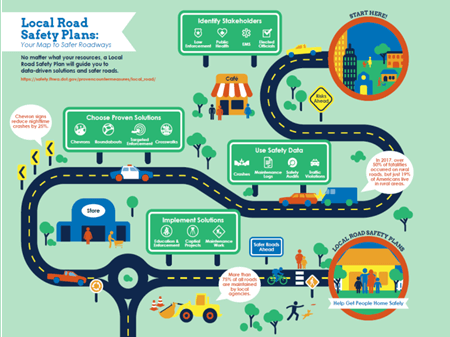NJLTAP Enews Volume 20 – Issue 3 – May/June 2018
Local entities own about 75 percent of the road miles in the United States. At the same time, local agencies tend to have the most limited resources to analyze and address safety risks. To help local agencies, the Every Day Counts (EDC) data-driven safety analysis (DDSA) team added a local focus to its efforts for EDC-4.
A primary goal is to increase the number of local agencies that have a local road safety plan (LRSP). LRSPs are a proven safety countermeasure that provide a framework for local practitioners to identify the specific conditions that contribute to severe crashes on their roadways. Agencies can then analyze local data to establish emphasis areas, determine risk factors, identify countermeasures, and prioritize safety improvements and strategies.
As part of this campaign, the DDSA team has partnered with the National Association of County Engineers (NACE) on a pilot project to help 25 Counties in California, Colorado, Florida, Nevada, Ohio, and Wisconsin develop LRSPs. The pilot provides agencies with a blended learning experience that includes technical assistance, a series of webinars, and, most recently, a hands-on workshop at the NACE Annual Meeting in Wisconsin that helped participants develop their draft LRSPs. During a follow-up webinar in May, counties will share their final plans and discuss next steps in implementation as well as lessons learned from the pilot.
The pilot provides agencies with a blended learning experience that includes technical assistance, a series of webinars, and, most recently, a hands-on workshop at the NACE Annual Meeting in Wisconsin that helped participants develop their draft LRSPs. During a follow-up webinar in May, counties will share their final plans and discuss next steps in implementation as well as lessons learned from the pilot.
“Our goal is to get several counties within each State to develop plans through the pilot,” said Brian Keierleber, Executive Director of NACE. “Those agencies can then be spokespersons to influence their peers that there is value in investing time in a plan. If we can demonstrate success stories using a simple approach, people will be more comfortable starting their own.”
Many pilot participants are already seeing the value of developing a plan and are eager to implement theirs.
Read more at FHWA Safety Compass.
May/June 2018
This newsletter is published biannually by the New Jersey Local Technical Assistance Program, Center for Advanced Infrastructure and Transportation, Rutgers University, using funds from the Federal Highway Administration and the New Jersey Department of Transportation. The opinions, findings, or recommendations expressed in this newsletter are those of the New Jersey Local Technical Assistance Program and do not necessarily reflect the views of the Federal Highway Administration nor the New Jersey Department of Transportation nor Rutgers University. Any product mentioned in this newsletter is for information purposes only and should not be considered a product endorsement.


